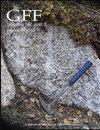重新考察了Sarek-Padjelanta山脉的大陆-海洋(Seve-Köli)边界:瑞典Caledonides
IF 1.2
4区 地球科学
Q2 GEOLOGY
引用次数: 4
摘要
摘要在瑞典喀里多尼亚山脉中,大陆-海洋边界由Iapetus衍生的Köli Nappe杂岩(KNC)的基底推力表示,该杂岩覆盖了源自Baltica外裂谷边缘和大陆-海洋过渡(COT)的Seve Nappe复杂岩(SNC)。目前的地图和文献将瑞典北部的Seve技术地层学(Sarek Padjelanta地区)细分为三个巨型透镜体,其中最低的(Vaimok透镜体)由石英-长石片麻岩和次级大理石组成,均为榴辉岩。它被Sarek透镜体覆盖,该透镜体由COT脉杂岩组成,沿其西部边缘,由千枚岩、片岩、石英岩、大理石和绿片岩组成的狭窄带。覆盖在这条带子上的是Tsäkkok透镜,其组成与Vaimok透镜相同。夹在两个复杂变形的高压岩石透镜体之间的中等压力且通常保存良好的片状岩墙复合体的情况导致了复杂的吸积模型,包括早奥陶世俯冲期间大陆边缘切片的无序堆积。基于对选定区域的详细研究和对先前概念演变的考察,本研究将萨雷克透镜体西部边缘的狭窄地带重新解释为下KNC的典型地带。对高压Seve岩石下方存在中压Köli岩石的有利解释是,在斯堪的纳维亚(志留纪-泥盆纪)吸积过程中,Seve-Köli-推覆序列的横卧褶皱和/或巨鞘褶皱,与瑞典喀里多尼亚中部的情况类似。以前大陆边缘俯冲过程中早期序列外叠加的模型需要重新考虑。本文章由计算机程序翻译,如有差异,请以英文原文为准。
The continent-ocean (Seve-Köli) boundary in the Sarek-Padjelanta Mts. revisited: Swedish Caledonides
ABSTRACT In the Swedish Caledonides, the continent-ocean boundary is represented by the basal thrust of the Iapetus-derived Köli Nappe Complex (KNC) which overlies the Seve Nappe Complex (SNC) derived from the outer rifted margin of Baltica and the continent-ocean transition (COT). Current maps and literature subdivide the Seve teconostratigraphy in northern Sweden (Sarek-Padjelanta region) into three mega-lenses, the lowest of which (Vaimok lens) is composed of quartz-feldspathic gneisses and subordinate marble, all hosting eclogites. It is overlain by the Sarek lens composed of a COT dyke complex and, along its western margin, a narrow belt of phyllites, schists, quartzite, marbles and greenschists. Overlying this belt is Tsäkkok lens of the same composition as the Vaimok lens. The situation with an intermediate-pressure and often excellently preserved sheeted-dyke complex intercalated between two lenses of complexly deformed high-pressure rocks invited to intricate models of accretion, including out-of-sequence stacking of slices of the continental margin during early Ordovician subduction. Based on a detailed study of a select area and examination of the evolution of previous concepts, this study reinterprets the narrow belt along the western margin of the Sarek Lens as typical of the lower KNC. The favoured explanation of the presence of intermediate-pressure Köli rocks below high-pressure Seve rocks is recumbent folding and/or mega-sheath folding of the Seve-Köli nappe sequence during Scandian (Siluro-Devonian) accretion, by analogy with the situation in places in the central Swedish Caledonides. Previous models of early out-of-sequence stacking during subduction of the continental margin need reconsideration.
求助全文
通过发布文献求助,成功后即可免费获取论文全文。
去求助
来源期刊

Gff
地学-地质学
CiteScore
2.80
自引率
10.00%
发文量
11
审稿时长
>12 weeks
期刊介绍:
GFF is the journal of the Geological Society of Sweden. It is an international scientific journal that publishes papers in English covering the whole field of geology and palaeontology, i.e. petrology, mineralogy, stratigraphy, systematic palaeontology, palaeogeography, historical geology and Quaternary geology. Systematic descriptions of fossils, minerals and rocks are an important part of GFF''s publishing record. Papers on regional or local geology should deal with Balto-Scandian or Northern European geology, or with geologically related areas. Papers on geophysics, geochemistry, biogeochemistry, climatology and hydrology should have a geological context. Descriptions of new methods (analytical, instrumental or numerical), should be relevant to the broad scope of the journal. Review articles are welcome, and may be solicited occasionally. Thematic issues are also possible.
 求助内容:
求助内容: 应助结果提醒方式:
应助结果提醒方式:


